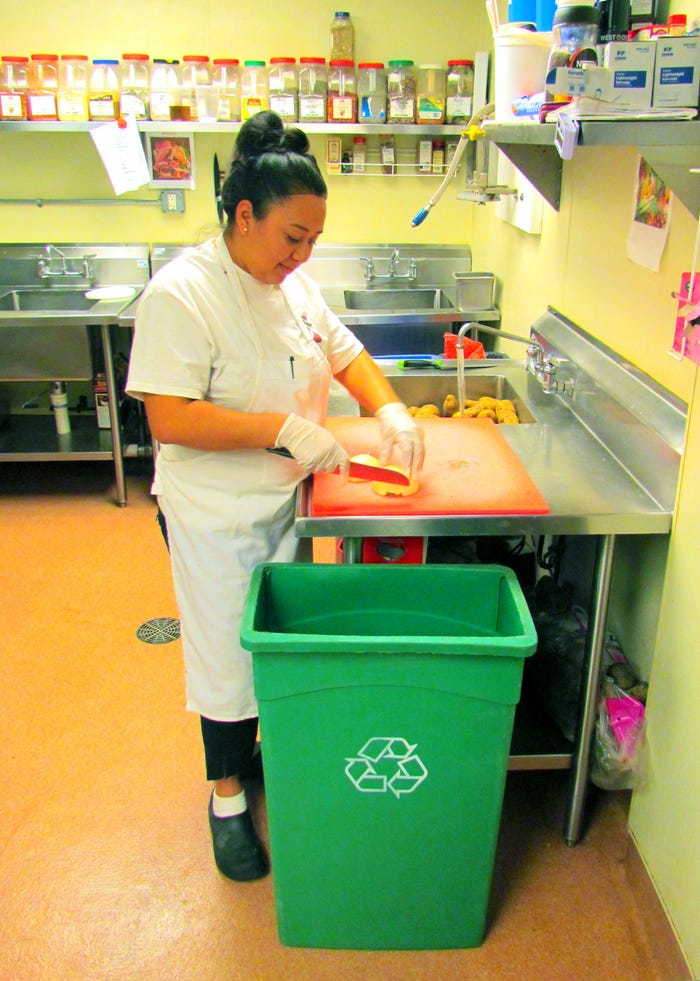How Orange County, N.C., Has Made Food Scrap Collection a Tradition
More than 2,700 tons of organics, mainly food waste, are diverted from Orange County and turned into compost each year.

Back in 1999, several Orange County, N.C., food retailers began participating in a food scrap collection pilot program, with the county picking up the tab for the service. From that pilot has grown a multi-pronged organic waste management system, which has created a ripple effect where organics diversion has become part of the region’s culture, beyond just the commercial sector.
Today, more than 2,700 tons of organics, mainly food waste, are diverted from Orange County and turned into compost each year. Beginning in kindergarten, kids routinely sort their cafeteria scraps. Residents do backyard composting, which they learn in free classes, and the University of North Carolina, Chapel Hill has launched its own collection system—one that has inspired other colleges to develop similar programs.
Orange County still pays for many businesses’ and small institutions’ collections, getting good rates for larger generators through its relationship with Brooks Contractor, which has collected the county’s food scraps to make compost for the past 19 years.
“In addition, we have a residential program where we sell commercial backyard composters at just above wholesale. We used to do a truckload sale once a year, but demand was so high that we sell yearround now,” says Blair Pollock, solid waste planner for Orange County Solid Waste Management Department.
People come to the landfill or a community center to see backyard composting in action and take workshops throughout the year. Those who don’t want to do their own composting drop off their organics at a waste and recycling center or at a farmers market on Saturdays.
The county also runs a yard waste program, grinding and aging the material itself and selling it as mulch. Landscapers and residents drop off their yard waste, and residents who live within the town limits of Chapel Hill, Carrboro and Hillsboro get free pickup.

The Chapel Hill Restaurant Group, which owns five restaurants, gets free food scrap collections at two of its restaurants in Orange County and has help seeing that its wasted oyster shells are put to good use instead of being tossed in the dumpster. Through the collection program, the Chapel Hill Restaurant Group has recycled more than 200 tons of oyster shells over the last 10 years.
“At first [the solid waste management department] arranged for us to bring our oyster shells to a seafood market owner who transported them to a drop-off site when he went to the coast to buy seafood,” says Greg Overbeck, co-owner of Chapel Hill Restaurant Group. “They were used in a program run by [NC Division of Marine Fisheries] that recycled oyster shells to help rebuild the state’s oyster beds. Now, Orange County landfill has a designated area where we dump our shells, which are collected and taken to the coast.”
The restaurant group was one of the early pilot participants and, to this day, gets free collection in Orange County.
“When Blair first approached us, we thought it would be problematic due to space, but it’s ended up working out [at all but one restaurant],” says Overbeck. “We had to rearrange the compound a little at one restaurant that made it a little more crowded and where it’s a little harder to clean. But that’s a small price to pay to do what needs to be done.”
Meanwhile, says Overbeck, the restaurants have cut their solid waste by nearly 85 percent.
“We created this culture where recycling is the expectation, and we start early. We have five-year-olds growing up with this. Students sort their cafeteria scraps five ways, and their efforts have reduced garbage from 180 bags a week to 15,” says Pollock.
There’s an education push for all ages. Muriel Williman, the county’s education and outreach coordinator, teaches hands-on compost classes and found that the best way to make an impact is to teach different methods to meet people where they’re at, whether they live in an apartment with confined space or have a backyard with a garden.
“It makes a difference when people can see, touch and smell worm beds,” says Williman. “When they see hot composts, they understand chemical reactions and ecosystems.”
Brooks Contractor’s 19-year relationship with Orange County has given it the opportunity to show what can be done, says Amy Brooks, the company’s co-owner.
“Orange County was the initial stimulant to get this whole closed loop cycle of organics happening countywide,” states Brooks. “It set an example to show other municipalities how to get this going and to make composting available to farmers, landscapers, residents, universities and others.”
About the Author
You May Also Like




.png?width=300&auto=webp&quality=80&disable=upscale)